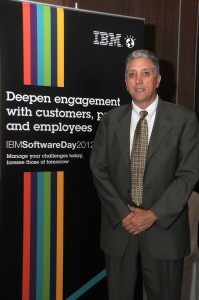IBM is a firm believer that the future of the enterprise is social and believes its messaging and collaboration solutions exemplify the future of business communications. Jack Welch, director of WW messaging at IBM Software Group, explains why the company believes traditional email will soon be a thing of the past.
 Email has become an integral aspect of communication both internal and external of a business. However, IBM believe the social revolution is about to change that.
Email has become an integral aspect of communication both internal and external of a business. However, IBM believe the social revolution is about to change that.
Organisations want a very fast and collaborative environment when it comes to communicating with colleagues, partners and customers, according to Jack Welch, director of WW messaging at IBM Software Group.
“They don’t want to sit and process emails all day. They want to bring social software in to their existing environments and they want to be able to use it to work faster, smarter and to take advantage of young talent that are used to these mobile and social tools,” Welch says.
“I think that trend is going to continue. I also think location-based applications are going to be brought into the enterprise more and more,” he adds.
He doesn’t anticipate a complete shift to social, but rather a combination of that with classic messaging.
“I think we are heading in a direction right now where many folks want to work in a social environment but they still want to bring some of that classic messaging in,” Welch says.
“There’s classic messaging where some folks add social, but if you flip it around there are folks that want to stay inside the social environment and then pull in some of that messaging countering and invite communications into that,” he adds.
In January IBM announced its intent to enable messaging inside the context of the social user experience.
“Some users may stay in the classic form – they may want to stay with an email client the way that they have it configured with many applications – and they may just want to add social. But there are some other folks that are making more of a dramatic shift and want to work completely with social and just add a bit of messaging,” Welch says.
Although IBM admits its messaging and collaboration business did go through a degree of uncertainty, it has now experienced several quarters of positive growth.
“One of the reasons for that growth is the linkage between social software with our connections platform. Another is applying or entitling companies to use some of those services within their Lotus Notes environment,” Welch says.
“That has not only triggered loyal customers to renew subscription, but some customers to say they’re adding new users because of the social capabilities included in the Notes client. Thing like sharing files, profiles and micro-blogging have been particularly of interest to many customers,” he adds.
One drawback of such solutions, some would suggest, is the apparent difficulty to prove it provides direct ROI. However, Welch says it provides more than enough benefits to warrant investment.
“I would simply say it’s going to give you speed. That’s one of the most noticeable attributes. Once the social transformation does begin, there are savings,” he says.
“We have a discipline and engagement that will tease out those savings and show where the value is, but when you look at organisations that have transformed with our social software, speed is one thing that continuously surfaces as a clear advantage over competitors,” he adds.
Welch believes the Middle East is quite aggressive when it comes to the uptake of social, but more so on a consumer level.
“Where I see similarities in this region to other regions is the way the people uses social to facilitate their day-to-day activities. I think consumer-wise the Middle East uses that very creatively and aggressively, but I think other regions use it for commerce more aggressively,” he says.
Asides from social, however, he ultimately sees 2012 as the year of mobile.
“I think tablets have just come up so strong. Many of our largest customers are looking at tablets and many of the product teams that we work with – both inside of IBM and our business partners – are optimising their user experience for tablets,” he concludes.





